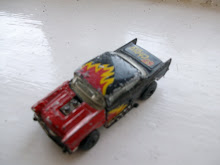Back when I was a wee nipper, I quite fancied the idea of being a racing driver in Formula 1. I can't tell you why - it was probably soon after I figured out at the age of seven that I would never be good enough to play at Old Trafford.
The reasons this didn't happen are of course down to a total lack of talent. But there was also the facts that a) I'm probably a bit too much on the tall side to fit in a F1 car and b) I'm a complete coward when it comes to putting myself in danger.
Much as I'm loath to quote Jeremy Clarkson, he once noted that racing drivers are missing the part of the brain that stops us going beyond a certain point. It takes a certain kind of bravery/stupidity to drive at speeds where one tiny mistake can be fatal. And even if F1 is infinitely safer than it was 40 years ago, there remains that element of danger that other sports don't have.
Ayrton Senna was the last man to die on the F1 track back in 1994, an event I remember well. He was part of a generation of racers that I would watch that seemed full of personality and passion alongside Prost and Piquet. Senna tracks the life of the man using archive film and audio footage, with some new interviews lapping over the pictures.
We're given very little information about his childhood, getting straight to what we want to know about: the racing. Starting in karts, he moved up the grades before coming to world attention at a rain-soaked 1984 Monaco GP, which he was looking nailed on to win before a controversial decision to quit the race.
Alain Prost, the driver who was just holding on the lead at that point, is soon set up by the documentary as Senna's nemesis. Methodical behind the wheel and apt at playing the political games behind the scene compared to Senna being the more "pure" racer just wanting to be on the track, and aiming to be the best.
Which he became, earning his first title in 1988 to mass celebrations in his home country of Brazil. Fiercely patriotic, he was regarded as one of the few reasons for the nation to be happy in a time of much difficulty. He would proudly wave the flag at races and the reactions of the Brazilian commentator to his first world title shows how much it meant.
Alongside his love of his country, Senna's religious faith is shown to be deeply important to him when off the track, with him constantly thanking god for his talent and victories. But despite all this, the real attraction of Senna is the footage of the racing, with the on-board clips being particularly exciting. Watching it compared to modern racing, it seems so much more on-edge, perhaps due to the drivers still using a stick gearshift when doing corners at 100mph+.
Naturally, the Senna/Prost rivalry is an excellent framing device and it seems amazing in retrospect that the two didn't end up trading punches eventually. The two were probably the best drivers in the world in the late 80s, and it's suggested that their animosity was purely through a need to better the other - as after Prost's retirement, Senna offered praise to his opponent.
It all leads to the tragic climax at San Marino. Seeing the footage from that weekend, especially after Roland Ratzenberger's death in qualifying, is eerie. He appears distant and highly strung, though it's easy to add meaning in hindsight.
Senna was perhaps the last great champion of F1 before going into the age of huge technological advancements. It doesn't take a huge leap to imagine that if he had survived, he may well have set a record amount of championships that Schumacher would never have surpassed. Or maybe he would have grown bored and retired.
Not just for big racing fans, Senna is an excellent film showing a man driven to be the best and making it, with a nice dollop of drama added in. You just wish that F1 now had characters in the same league.
Sunday, 5 June 2011
Subscribe to:
Post Comments (Atom)

No comments:
Post a Comment